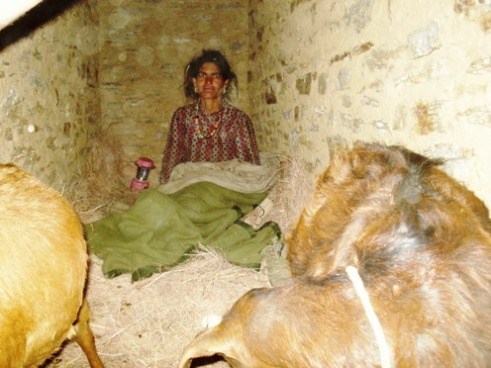KATHMANDU: Case I : At the age of four, she was startled to discover a bloodstain on her mother’s clothes.
By 10, she found herself wondering why her close friend, who used to accompany her to school regularly, disappeared for fifteen days.
When she was 14, she experienced her first menstruation and was overwhelmed with confusion and tears.
Her family took her to a distant relative’s home for eleven days of isolation.
These early experiences belong to a senior female journalist working in state-run media in the federal capital, representing Lalitpur district.
Case II: During his childhood, he found it uncomfortable to sleep without his mother for 4-5 days a month.
One day, his childhood friend, with whom he used to play, suddenly disappeared.
He cried and wandered around, hoping to find her.
Days later, she reappeared. This became a recurring pattern every month.
His sisters and female relatives often isolated themselves for certain days each month.
At school, his female classmates also missed classes regularly.
Case III: A journalist from Sankhuwasabha district recalled learning that her mother had become ‘untouchable’ due to menstruation.
Witnessing her mother bleed heavily every month was disturbing for her at a young age.
At 13, she menstruated for the first time and was chased away from home to be locked up in someone’s house. Despite moving to an urban area, isolating girls during their first menstruation remained normal.
She observed her elder sister and younger sister undergoing the same experience.
Case IV: She represents Dadeldhura and has similar accounts.
She recalled being isolated from her family during menstruation, barred from seeing her elder brother and father, and confined to a corner of the ground floor of her house for five days.
These journalists from various parts of the country recently gathered in Chitwan for an orientation on dignified menstruation.
The event was organized by the Radha Paudel Foundation: Global South Coalition for Dignified Menstruation under the Media Fellowship on Dignified Menstruation, themed ‘Dignified Menstruation is Everyone’s Business’.
Author and rights activist Radha Paudel stated that such practices form menstrual discrimination, a root cause of unequal power relations.
Research suggests that menstruation discrimination exists in every society, but the forms vary.
Women and menstruators are isolated from their families, prohibited from entering the kitchen, forced to quit school, restricted from certain foods, barred from visiting places of worship, and stigmatized.
They often lack access to materials for managing menstruation.
Despite the inconvenience faced by survivors, there is a lack of in-depth understanding of the significant impact of such discrimination on power structures, said Paudel.
“Such practices prevent menstruators from becoming complete humans,” she argues.
According to Paudel, discrimination breeds inferiority among those affected, which is internalized, socialized, and leads to a lifelong cycle of discrimination.
She emphasizes the need to define dignified menstruation through a transformative, human rights, inclusion, and feminist approach.
Rephrasing of Chhaupadi Warranted
Paudel expressed concerns over using the term ‘Chhaupadi’ to describe menstrual discrimination in western and far-western Nepal.
The term, which translates to ‘timing of menstruation’, has been globalized to portray a negative image of these regions.
Menstruation discrimination, a biological phenomenon, is socially constructed and exists globally, though with varying intensity.
Paudel concludes that such discrimination is ubiquitous and unjustified.
Menstruators must have the space for dignified menstruation practices, access to safe and eco-friendly materials, and menstruation-friendly infrastructure.
No discrimination should exist during menstruation days and non-menstruation days.
Combined efforts are needed to build a dignified menstruation-friendly society, community, schools, family, state, and globe.
Ending all restrictions against menstruators is essential for building an egalitarian society, as envisioned by international rights conventions and the Constitution of Nepal.
“It is imperative to ensure that menstruators and non-menstruators live with dignity in a regenerative society.”
RSS









Comment